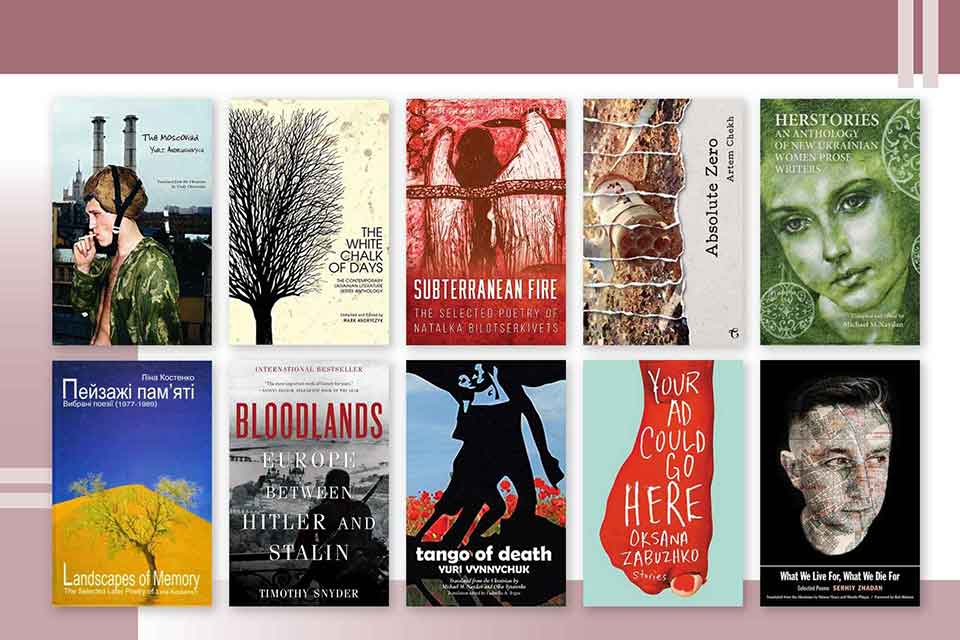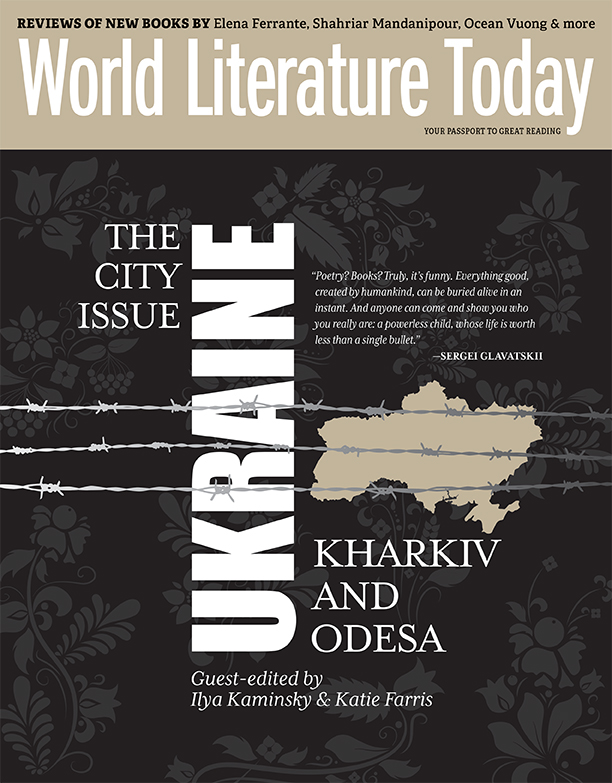Literary and Historical Sources for Understanding Ukraine: A Recommended Reading List

In the past, regrettably, there has been a dearth of translations of Ukrainian literature available in English. This situation has dramatically changed over the last decade with numerous authors and various new anthologies now in print. That number has been increasing virtually every day as Ukraine, largely as a result of the current tragedy, has become more visible to the world. The list I’ve compiled here, while not comprehensive by any means, should give readers a good starting point to get a deeper understanding of Ukrainian literary culture and the centuries of Ukrainians striving for freedom and independence despite constant repression by neighboring countries, particularly Tsarist Russia, the USSR, and the Russia of today that continues to propagandize the blatant fallacy that Ukrainians do not exist as a people. Over thirty years of independence, a lengthy history of a rich and talented group of writers and intellectuals, as well as more than forty million Ukrainians fighting today and calling for their right to exist would emphatically say otherwise. Virtually all of these volumes are available through major internet booksellers as well as via publishers’ websites.
Taras Shevchenko
The core and essence of Ukrainian culture truly begins with Ukrainian national bard Taras Shevchenko (1814–1861). The most recent and most extensive version of Shevchenko’s collected works in a modern English idiom is Peter Fedynsky’s The Complete Kobzar: The Poetry of Taras Shevchenko (Glagoslav, 2013) and includes translations of all of Shevchenko’s poetry as well as color illustrations of his paintings and drawings. In one of Shevchenko’s most famous poems, known by heart by most Ukrainians and posthumously titled “Testament” in Fedynsky’s translation, Shevchenko writes:
Bury me, rise up,
And break your chains
Then sprinkle liberty
With hostile wicked blood.
Shevchenko’s prophetic words of 1843 are coming true today.
Anthologies of Ukrainian Literature
Herstories: An Anthology of New Ukrainian Women Prose Writers (Glagoslav, 2014; reviewed here in WLT) comprises a compilation of Ukrainian women prose writers from both the older generation and the younger including Lina Kostenko, Maria Matios, Oksana Zabuzhko, Evheniya Kononenko, Tanya Malyarchuk, Sophia Andrukhovych, and many others. The long-overdue phenomenon of Ukrainian women authors exploded on the literary scene after Ukrainian independence in 1991.
Mark Andryczyk’s edited and co-translated volume of contemporary Ukrainian literature, The White Chalk of Days (Academic Studies Press, 2017), will be reissued by Penguin Random House UK in July 2022 and was reviewed here in WLT. The volume includes Ukrainian authors invited to give readings at the Harriman Institute of Columbia University and the Kennan Institute in DC. It includes translations of many of Ukraine’s most significant writers of the past half-century including Yuri Andrukhovych, Serhiy Zhadan, Marjana Savka, Viktor Neborak, Andrey Kurkov, Oleh Lysheha, Serhiy Zhadan, Yuri Vynnychuk, Ivan Malkovych, Vasyl Gabor, Hrytsko Chubai, and Oleksandr Boichenko as well as younger voices such as Sophia Andrukhovych and Lyuba Yakimchuk.
The Frontier: 28 Contemporary Ukrainian Poets (Glagoslav, 2017) is a bilingual edition translated by Anatoly Kudryavitsky that gives a sampling of a wide range of contemporary Ukrainian poets, from established ones such as Serhiy Zhadan, Lyuba Yakimchuk, Halyna Kruk, Marianna Kijanowska, and Vasyl Holoborodko to the younger generation of poets.
Trafika Europe in issue 7 (2016) published a special volume dedicated to contemporary Ukrainian literature under the title Ukrainian Prayer. It is available to read online for free.
Volume 5 (2018) and volume 6 (2021) of the translation journal Ukrainian Literature, edited by Maxim Tarnawsky, includes translations of several prominent classic Ukrainian and contemporary authors. It is available in paperback.
Individual Authors
Yuri Andrukhovych is one of the most brilliant Ukrainian writers writing today. He emerged out of the Bu-Ba-Bu literary performance group in the middle of the 1980s. His novel Perverzion (Northwestern University Press, 2005) is an extraordinarily inventive work that reconstructs the life of Ukrainian performance poet Stanislav Perfetsky from various sources. It encompasses Ukraine’s strivings and parodies Western stereotypes and misperceptions of Ukraine and Ukrainians in an inventive way. Andrukhovych’s Recreations (Canadian Institute of Ukrainian Studies, 1998) has been published in Marko Pavlyshyn’s translation. And two other novels published by Spuyten Duyvil, The Moscoviad (2008) and Twelve Circles (2015), are available in Vitaly Chernetsky’s translations. (Editor’s note: In response to the 2013–2014 Maidan protests, Andrukhovych wrote “Protesting on the Square in Kiev: Some Literary Insights” and penned an open letter to the West that appeared in WLT. For more on the Bu-Ba-Bu generation and Ukrainian literary identity after the Orange Revolution, see the special portfolio edited by Michael Naydan in the September 2005 issue of WLT.)
Maria Matios’s novel Sweet Darusya: A Tale of Two Villages (Spuyten Duyvil, 2021; reviewed here in WLT) has been mentioned by numerous sources such as the New York Review of Books and the Toronto Globe and Mail to be one of the best novels to read to come to an understanding of the traumas of Ukrainian history in the way that it microcosmically describes the lives of Hutsul villagers in the Carpathian Mountains during Nazi and Soviet occupation. Andrei Kurkov has noted that it is the best Ukrainian novel written since Ukrainian independence. Her novel Hardly Ever Otherwise (Glagoslav, 2012) is available in Yuri Tkacz’s translation.
Prolific Galician / western Ukrainian writer Yuri Vynnychuk’s novel Tango of Death (Spuyten Duyvil, 2019), narrated in two alternating timelines, is a fascinating and artful re-creation of wartime Lviv in western Ukraine juxtaposed to contemporary times. The two alternating plotlines coalesce and become resolved at the end of the novel. It is one of the first Ukrainian novels to deal with the Shoah in Ukraine and describes the suffering caused both by the invading Nazis and the Red Army. Vynnychuk is a master stylist and psychologist of the human soul in his writings. His magically realistic style is influenced by Borges. Other works of his available in English include The Fantastic Worlds of Yuri Vynnychuk (Glagoslav, 2016) and The Night Reporter: A 1938 Lviv Murder Mystery (Glagoslav, 2021).
Serhiy Zhadan is one of Ukraine’s most prominent Ukrainian poets and prose writers. His writing such as Voroshilovgrad (Deep Vellum, 2016), in Reilly Costigan-Humes’s and Isaac Stackhouse Wheeler’s translation, often deals with the post-Soviet space of eastern Ukraine, which represents the aftermath of an industrial apocalyptic wasteland that has become a hotbed for conflict and war. His more recent writings such as the novel The Orphanage (Yale University Press, 2021), also in Reilly Costigan-Humes’s and Isaac Stackhouse Wheeler’s translation, deals with the physical and emotional horrors of the Russian proxy war in eastern Ukraine. His poetry, which is direct and meant to strike a raw nerve, is available in Virlana Tkacz’s and Wanda Phipps’s translations in What We Live For, What We Die For: Selected Poems (Yale University Press, 2019) as well as in Ostap Kin’s and John Hennessy’s translations in A New Orthography: Poems (Lost Horse Press, 2020). Zhadan was recently nominated by the Committee of Literary Studies of the Polish Academy of Sciences for, besides the great literary value of his works, his constant and courageous support for freedom of the Ukrainian people.
Oksana Zabuzhko, Ukraine’s top feminist prose writer, was trained as a philosophy scholar. Her reputation as a writer was established by her short novel Fieldwork in Ukrainian Sex (Amazon Crossing, 2011), which was translated by Halyna Hryn. Her lengthy novel The Museum of Abandoned Secrets (Amazon Crossing, 2012), translated by Nina Shevchuk-Murray, deals with the vicissitudes and trauma of Ukrainian history over several generations. A collection of her short stories edited by Nina Shevchuk-Murray and with translations by various translators, Your Ad Could Go Here, also appeared with Amazon Crossing (2020). Her poetry is available in translation in a recent edition edited by Askold Melnyczuk under the title Selected Poems (Arrowsmith, 2022).
A selection of leading contemporary poet Natalka Bilotserkivets’s poetry under the title Eccentric Days of Hope and Sorrow (Lost Horse Press, 2021; reviewed here in WLT) is available in Ali Kinsella’s and Dzvinia Orlowsky’s translations. With eight different translators, Subterranean Fire: The Selected Poetry of Natalka Bilotserkivets, has appeared with Glagoslav (2022) and represents a “stereostopic” view of her poetry with multiple translators at times translating the same poem.
Oleh Lysheha is a legendary Ukrainian poet greatly influenced by writers such as Walt Whitman and Henry David Thoreau, whom he translated into Ukrainian, as well as Chinese poetry. In collaboration with the author, James Brasfield published The Selected Poems of Oleh Lysheha (Harvard Ukrainian Research Institute, 1999), which earned the 2000 PEN Club Award for Poetry in Translation. While the volume is currently out of print, hopefully it will be made available again.
Lina Kostenko is Ukrainian literature’s most prominent woman poet of the twentieth and twenty-first centuries. My two books of her poetry in translation are out of print: Selected Poetry of Lina Kostenko: Wanderings of the Heart (Garland, 1990) and the bilingual edition Landscapes of Memory: The Selected Later Poetry of Lina Kostenko (Litopys, 2002), but I would be happy to provide a PDF file of the latter for anyone who might like to read her.
Glagoslav has published volumes of translations of several historically significant Ukrainian poets including Hryhory Skovoroda (eighteenth century), Taras Shevchenko (nineteenth century), Pavlo Tychyna, and Maksym Rylsky (twentieth century) as well as contemporary poets Oleh Ilchenko, Attyla Mohylny, and Natalka Bilotserkivets. Bucknell University Press has published a book of translations of great early modern Ukrainian poet Bohdan Ihor Antonych, The Essential Poetry of Bohdan Ihor Antonych: Ecstasies and Elegies (2010). The latter will soon be released as an open-source ebook. The Harvard Ukrainian Research Institute has just begun a library of Ukrainian works in translation. Information about their current and forthcoming titles can be found here.
The War in Donbas
Oksana Maksymchuk and Max Rosochinsky’s edited and co-translated Words for War: New Poems from Ukraine (Harvard Ukrainian Research Institute and Academic Studies Press, 2018) comprises a collection of translations of the works of sixteen contemporary authors who write about the tragedies and trauma of the war in Donbas that Russian-backed separatists began in 2014, which has led to the current all-out Russian war against Ukraine.
Oksana Maksymchuk, Max Rosochinsky, and Svetlana Lavochkina provide translations of Ukrainian poet Lyuba Yakimchuk’s book Apricots of Donbas (Lost Horse Press, 2021). Yakimchuk, who made an appearance to read her poetry at the 2022 Grammy Awards, catalogs in her book the pain and destruction wrought on her homeland by Russian invaders.
Artem Chekh’s Absolute Zero (Glagoslav, 2020), translated by Oksana Lutsyshyna and Olena Jennings, presents the wartime diary of a Ukrainian soldier about the war in Donbas.
Essays
Yuri Andrukhovych is one of Ukrainian culture’s most articulate voices. His masterful essays on Ukraine’s historical and psychological locus as an integral part of Europe appeared in Mark Andryczyk’s and Michael Naydan’s translations under the title My Final Territory: Selected Essays (University of Toronto Press, 2018).
Volodymyr Yermolenko has compiled a collection of essays by various authors under the title Ukraine in Histories and Stories: Essays by Ukrainian Intellectuals (Ibidem Press, 2020). It includes translations of works by prominent Ukrainian writers, philosophers, historians, intellectuals, and political experts.
Ukrainian Language Materials
Yuri I. Shevchuk’s Beginner’s Ukrainian (Hippocrene Books, 2022) is the most accessible and up-to-date textbook for learning the contemporary Ukrainian language. It includes an interactive online workbook.
Yuri I. Shevchuk’s Ukrainian-English Collocational Dictionary (Hippocrene Books, 2021) is the most recent major dictionary of the Ukrainian language and a must-have volume for translators and learners of Ukrainian.
Ukrainian History
The Gates of Europe: A History of Ukraine (Basic Books, 2021), by Harvard Ukrainian Research Institute’s Hrushevsky Professor of Ukrainian History Serhii Plokhy, is the most definitive and up-to-date history of Ukraine that will give readers a complete picture of Ukrainian history. That Ukrainian perspective of the author is extremely important to counter the colonial narratives promulgated by Russian historians, who appropriate Ukrainian Kyivan Rus from the eighth to the twelfth centuries as their own. This kind of thinking lays the groundwork for Russian colonialism that denies Ukrainian nationhood and the Ukrainians’ existence as a people. The term Rus does not mean Russian. From Plokhy’s book, readers will acquire a deep understanding of the Kozak (aka Cossack) period and other eras of striving for Ukrainian independence as well as tragedies such as the Holodomor (the Stalin-induced famine that killed some five million Ukrainians in 1932 to 1933).
Another comprehensive and reliable volume published earlier is Orest Subtelny’s Ukraine: A History (4th ed., University of Toronto Press, 2009). This book is particularly significant in that it was translated by Yuri Shevchuk into Ukrainian and printed in Ukraine in extremely large print runs, giving Ukrainians in Ukraine their first completely unexpurgated history of their nation without Tsarist or Soviet censorship and ideology.
Timothy Snyder’s Bloodlands: Europe between Hitler and Stalin (Basic Books, paperback 2022) is a seminal historical work for understanding the killing fields of Europe, including much-suffering Ukraine, caught in the grips between two fascist/autocratic regimes.
Anne Applebaum’s Red Famine (Doubleday, 2017) presents a thorough examination of the Holodomor and the destruction of the Ukrainian intellectual class in the 1920s and 1930s. Robert Conquest’s The Harvest of Sorrow (Oxford University Press, 1987) and Slavko Nowytski’s documentary film, Harvest of Despair (1985), which is available on YouTube, are pathbreaking precursors to it.
A biography by Serhii Rudenko under the title Zelensky: A Biography has been translated by Alla Perminova and Michael Naydan. It is in the final stages of production and scheduled to be released by Polity Books in July 2022. The volume covers the major events in President Zelensky’s life, from the people who surrounded and influenced him during his formative years in Kryvyi Rih through his time as president and leader of the war effort.
Pennsylvania State University
When you buy a book using our Bookshop Affiliate links on this page, WLT receives a commission. Thank you for your support!











